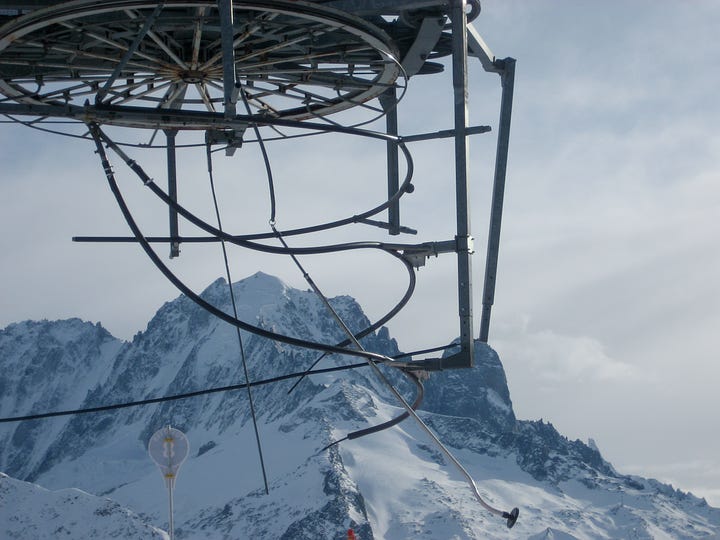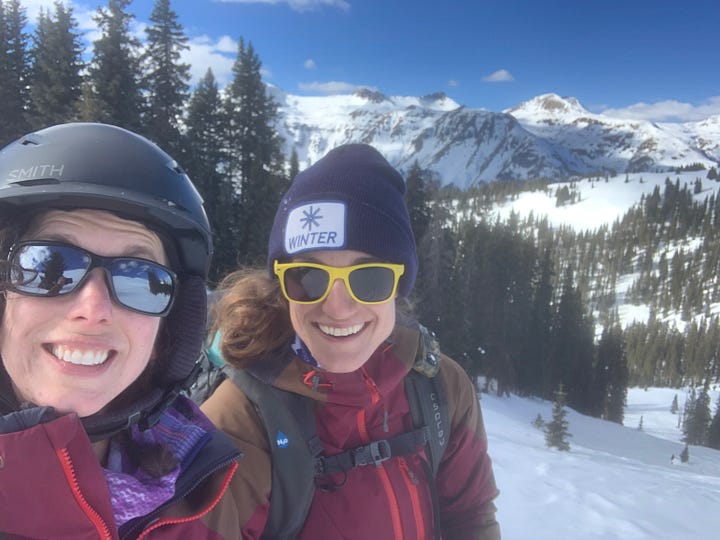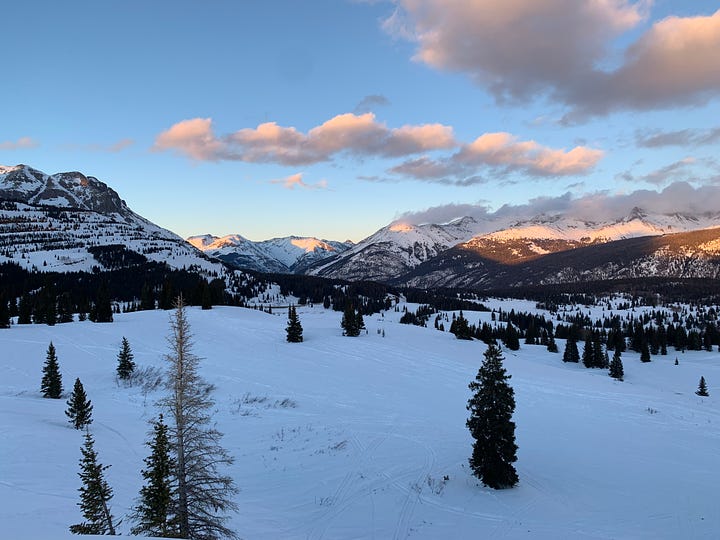4. This is your wake up call...
The importance of listening to your meniscus. I mean intuition.
fevrier, 2009
chamonix, france
“Mademoiselle.” A tap on my leg. “Mademoiselle?”
I open my eyes. I’m lying face-up on a ski run. Constellations of snowflakes dot my goggles. A Frenchman looms above me, prodding me with his ski pole like a dead raccoon. I must have blacked out.
He speaks again, a jumble of incomprehensible sounds. I catch the word “tête,” French for “head.”
“Je ne sais pas…” I don’t know.
“Votre tête,” he taps his head. “Is ok?”
He wants to know if I hit my head. I rewind: it’s my birthday. I'm snowboarding in France. So far so good. But where are my friends and why am I prostrate on a patch of ice? The last thing I remember is riding merrily along before suddenly skidding out, and landing… on my butt. Holy Jesus. I think I preferred being unconscious.
“Mademoiselle, votre tête?”
“Oui, it’s ok. C’est…”
Why don’t I know how to say butt and mind-numbing pain? I reference my catalog of words. Head, shoulders, knees… This is really not the moment for a vocab test. I roll delicately onto one side and touch my butt.
Plaintively gazing up at him, I utter, “C’est ça.”
“Ok,” relieved, he hops downhill on his skis and glides away, leaving me ass in hand. Or whatever you call it in French.


february, 2022
silverton, colorado
If you’re a skier, you’ll know that any story beginning with, “it was the last turn of the day…” is not going to end well.
It was the last turn of the day.
I can literally see my car. It’s less than 100 yards away, parked in a small turnout. An alpine valley unfolds miraculously below, snow crystals twinkling in the afternoon sun. But I’m over here, sitting on a snow-packed 4x4 road, holding my knee. Later, the doctor will ask if I felt a pop, and I’ll counter, “No, it was like getting hit with a baseball bat.”
As far as backcountry ski accidents are concerned, I should feel extremely lucky.
But I’m terrified. I know that I’ll survive—my ski partner is already post-holing through the snow on her way back to rescue me—so it’s not that. This is a terror rooted in the deep, irrefutable knowledge that I’ve just done something stupid, really, really, stupid. I can’t close my eyes and wish it away, nor can I hold onto hope that everything will turn out alright.
I don’t need an MRI to tell me what I already know. I’ve been here before; sitting on a mountain, holding my knee. Two years ago, I tore my ACL while snowboarding. And I remember that worse than the injury was the surgery. And even worse than the surgery, was the rehab. Months relearning how to walk, jump, and run. In fact, I’m still going to physical therapy. What was I doing here?
The worst thing about this genre of terror is knowing that the really, really stupid thing that just happened was avoidable. I’d been nervous about heading into the backcountry this morning. And, come to think of it, I’d been nervous each time I strapped into my bindings since surgery. So, seriously, what was I doing here?
After tearing my ACL, I thought I might write about it one day, so I did a bit of research. One particular statistic stood out: “Fewer women return to preinjury sports levels than men after anterior cruciate ligament (ACL) surgery.”1 This observation was reported in numerous studies, and most commonly chocked up to “greater anxiety concerning the impact on their lives” among women. Smarter women than me, apparently.
I did not want to be a statistic. In fact, I wanted to be like—in retrospect—my mostly male friends who continued to ski despite bodily harm. And besides, I’d bounced back before, even after damage to les fesses (the French word for butt). I loved it. Snowboarding was my thing.
However, after the ACL surgery, I began to notice a small, soft voice coming from somewhere just above my navel.
It whispered, “I don’t want to do this anymore.”
And how, dear reader, do you think I responded? I bought a new snowboard.


march, 2022
durango, colorado
Yann, my French teacher, is surprised to see me, and smiles nervously.
“Are you sure you want to have a lesson today?” He asks in English.
“Oui, absoluement.”
I’m heavily medicated. Three flavors of painkillers. Plus, whatever nerve-block the nurse jabbed into my leg. My knee, wrapped in gauze and ice, is strapped into a whirring device that methodically bends and straightens it. Roxy, my cat, scowls suspiciously and avoids coming near me when it’s turned on. Yesterday, I had surgery—for a “bucket-handle tear” on my meniscus—don’t ask, it’s gross.
But that’s off-screen. All Yann can see is my brave, determined face. And possibly my glazed eyes.
To say that this injury was a wake-up call isn’t entirely correct. I’m accustomed to my exasperated intuition throwing buckets of water on my head, shouting “Wake up!” This latest dousing has merely provided a moment of clarity, a chance to reflect upon the numerous times that I’ve ignored my internal voice, gut, the universe, whatever you want to call it.
I’ve accepted jobs I knew that I’d hate. I’ve turned down opportunities I knew that I’d love. I’ve stayed in relationships that I knew were unhealthy. All because it’s what I thought I was supposed to do. I was very much concerned with doing things correctly, getting it right. Exceeding expectations (except my own, of course).
It’s a masochistic pattern which has led me here. When I awoke from the procedure, groggy and confused, the surgeon proudly stated that he had repaired my shredded meniscus with something like 14 stitches. (That’s a lot, apparently). To ensure their hold, he has ordered that absolutely, under no circumstances, am I to put weight on my knee for the next five weeks; which rules out most day-to-day activities, like walking. I feel like I’ve been sentenced to house arrest.
So, of course, now, of all times, that soft, sweet little voice of mine has decided to speak up. And it’s saying the most ridiculous thing. It has begun to whisper, “Let’s go to France.” This whisper is getting louder and harder to ignore. “Hey, Margaret, let’s go to France.” As if that’s a real thing in my world.
But. I think it’s time to start listening for a change. And you know what doesn’t require the use of my leg? A five-week French language intensive.
“Margaret?” Yann asks.
“Oui?”
“Tu es prête?” Are you ready?
“Oui, c’est parti!” Let’s go!
I’d love to hear how you listen to your intuition. Do you let yourself get pushed to the limit before acknowledging your inner voice? Or do you have a practice in place for checking in with yourself? You know, asking for a friend. Feel free to leave your thoughts in the comments section.
Lastly:
Merci beaucoup for reading idiomatic. With so many demands on our time, I appreciate your attention. If you thought it worth your while, please consider sharing idiomatic with a friend.
My publishing schedule is roughly every other week, but you can find more regular photos from my life abroad on Instagram.
Music was a big part of my “immersion from abroad” strategy, so much so that I made a Spotify playlist of my favorite French musicians. Listen along here.
Up next on idiomatic
Siegel, Mark G. “Women Do Not Return to Sport at the Same Level after ACL Reconstruction as Often as Men: This May Be Associated with Lower Risk Tolerance--and Not Necessarily a Bad Thing!” Arthroscopy: The Journal of Arthroscopic & Related Surgery, 1 Jan. 2024, https://doi.org/10.1016/j.arthro.2023.12.020.





Maryrose came up to me yesterday and said, "have you read Margaret's piece yet??" Your newsletter has quickly become required reading in our household. In our defense, you really are good at this.
I completely copied you today. I tried dropping a little video message into the beginning of mine, because you did it with yours: https://talkingbigideas.substack.com/p/mitt-romney-and-the-shaggy-implication.
Imitation being the highest form of flattery & all.
Hi Margaret, I am so happy to have stumbled upon your work today. I want to learn French and always have, and I really loved reading your story of how you found yourself in a French intensive.
I was also a snowboarder once upon a time, and bodily harm was also what made me leave it behind. I also ignored a pop on a climbing wall a few years ago, which I later learned was a big ol’ tear in my MCL that, thankfully, didn’t require surgery but did give me a giant swollen knee any time I even thought about climbing. So, I also no longer climb.
I’m really excited to read more of your work. There’s something so instructive and kinda magical about reading other people’s moments of intuition: how they feel, where they are (under the navel, in the stomach, sitting on the chest), and what happens when we decide to listen to them.